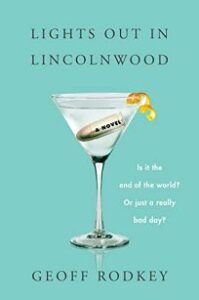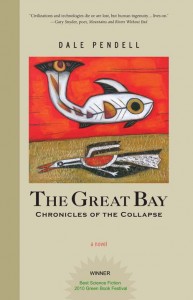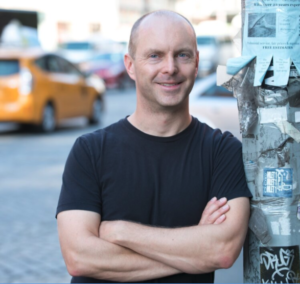Geoff Rodkey: Lights Out in Lincolnwood (A Novel)
November 3, 2021 by David
Filed under Fiction, WritersCast
 Lights Out in Lincolnwood – A Novel – Geoff Rodkey – HarperCollins – 9780063065925 – Paperback – 544 pages – $16.99 – ebook versions available at lower prices
Lights Out in Lincolnwood – A Novel – Geoff Rodkey – HarperCollins – 9780063065925 – Paperback – 544 pages – $16.99 – ebook versions available at lower prices
I have to admit that I did not expect to really like this book anywhere near as much as I did. I’ve certainly read my share of suburban based stories that wittily poke fun at modern life. But Geoff Rodkey surprised me with Lights Out in Lincolnwood and I found myself reading it every day in big chunks – the kind of book that is dangerous to my sleep as I can’t stop reading. Like eating dried fruit. Except that I did not regret it later.
Today’s world seems to encourage writers to imagine the worst about our future – this book does that for sure. But Rodkey keeps us from getting depressed with humor, even as he tells us the truth about ourselves and our illusions we like to carry around about how we would act under pressure.
And there is not much more pressure one can imagine than the story Rodkey tells here, as an unexplained collapse of our infrastructure suddenly happens. By focusing on a single family and its community, Rodkey is able to bring the whole story down to a practical level, as his characters, whom we readily recognize, go through an almost Marxian (that’s Marx Brothers by the way) experience that readers can’t help laugh at and simultaneously shudder about. It is frighteningly close to home.
How do we survive calamity when we have no idea how to do anything that is needed to survive and the tools we need don’t work and the neighbors we thought we knew turn into completely different people – or maybe reveal themselves for whom they really are, at last.
The entire book takes place during an action packed and tension filled four days – chaos, change, fear, hysteria, and perhaps even joy mark the struggle of the Altman family as they try to determine how to live in a world without technology. They struggle with getting food and water, their modern past-times and addictions, neighbors who become militaristic and brutal, and the town’s looting of the local Whole Foods is the least of the craziness they have to contend with as they try to figure out just what is going on and how they will manage to get through a worldwide catastrophe.
It’s impossible to not be captivated by this book. It was fun to read and to talk to Geoff, and I know it made a difference as its story line and characters have stayed with me long after I finished reading the book. We had a terrific time talking for Writerscast about this book and Geoff’s work as a writer in various media.
Geoff Rodkey is the New York Times best-selling author of ten children’s books, including the Tapper Twins and Chronicles of Egg series; We’re Not From Here; and Marcus Makes a Movie, a collaboration with actor Kevin Hart. He’s also the Emmy-nominated screenwriter of Daddy Day Care and RV, among other films. Geoff lives in New York City with his family.
In particular, We’re Not From Here, A sci-fi comedy for middle grade readers about a family of humans who immigrate to an alien planet after Earth is destroyed (written for middle grade readers) looks like another fun Rodkey story.
Podcast: Play in new window | Download
Dale Pendell: The Great Bay: Chronicles of the Collapse
August 21, 2010 by David
Filed under Fiction, WritersCast
 978-1556438950 – North Atlantic Books – Hardcover – $21.95
978-1556438950 – North Atlantic Books – Hardcover – $21.95
This is an amazing novel. Consider it a work of “ecological science fiction” as some have called it. I found it captivating, terrifying, incredibly emotive and reading it becomes almost a spiritual exercise. Pendell posits a worldwide collapse of population from a biological war gone amok. More than 95% of humanity disappears, almost overnight. He actually does not spend much time on this part of the story, horrific as it is, because that catastrophe is really just the lead in for the much bigger story of what happens next.
Aside from the critical principle of understanding, that modern human society will simply collapse, that going back to prior technologies becomes impossible because people no longer have the knowledge or skills, to live the way our ancestors did, and critically, cannot relearn them overnight in the face of societal collapse, the central tenet of this novel is that climate change will have been unleashed by what modern society *has already done* to the natural world. The computer models of planetary climate change are simply not able to fully contain and predict the massiveness of what is about to happen to the planet and the natural world that inhabits it.
The novel is essentially a brilliant imagining of what might or could be the future of the planet over the next hundreds, thousands of years, based on the supposition that humans have already begun this process of change. It’s a rich set of interlocking stories, mostly focused on the area that is known today as California, a bio-geographic landscape that author Pendell knows well, and imagines changing in profound and sometimes painful ways for the reader of his story.
This is a very unusual novel – really the main character is the planet and there are no traditional heroic human characters at its center. While we might search for and find labels for it (“dystopian” or “utopian,” “science fiction” or even “parable”), I’d rather think of it as a kind of vision-telling, a myth in the making, that seeks to change the way we think about ourselves. Indeed, there is a great deal of suffering and difficulty in the book, and at the same time, a powerful sense of continuity, what truly sustains. As the great poet Gary Snyder (who is a fictionalized character in the book, as it happens), says about the novel: “Civilizations and technologies die or are lost, but human ingenuity–families, tribes, and villages, the musicians, shamans, philosophers, and people of power–live on.” I’d add that not only does human ingenuity live on, so does Gaia, our planet home, adjusting and re-adjusting its inner and outer being, regardless of which or how many humans may be hanging on for dear life.
In my conversation with Dale, we talked about his background as a writer, poet, biologist, and how this brilliant vision of a book came into being. It’s an interview and a book I’d recommend to all my friends and colleagues – it’s impossible to read and not do alot of thinking about the future, as well as what we need to do about it – right now.
Podcast: Play in new window | Download

